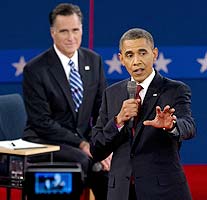
Washington, October 17: A decidedly more aggressive President Barack Obama went on the offensive right from the word go as he clashed with Republican challenger Mitt Romney over their conflicting visions in their second encounter.
Romney, who by all accounts bested the president in their first encounter two weeks ago to put his campaign on an upswing, in turn used Tuesday night's pivotal second encounter at Hofstra University in Long Island, New York, to recount a litany of Obama's own failings as president.outs
Meeting just three weeks before the Nov 6 presidential poll, the two contenders went at each other often on topics ranging from the economy, taxes and outsourcing to energy, women's rights and immigration in a tension filled exchange.
Coming into his own, Obama did not disappoint his supporters and aides who wanted him to put in a "stronger, more assertive performance" at the second debate after his admittedly bad night at Denver to hand over to his rival an advantage that he had enjoyed for weeks.
Debate watchers were divided on who won Tuesday night's debate with 46 percent in a CNN/ORC International survey saying Obama won the debate, while 39 percent said Romney fared better. The seven-point margin falls within the poll's sampling error.
As many as 73 percent said Obama did better than expected, compared to 37 percent who said the same about Romney.
The results offer a stark contrast from the first presidential showdown Oct 3, when 67 percent of debate watchers said Romney fared better while 25 percent said Obama won the debate.
But how far his aggressive performance would help Obama get back into the game is yet to be seen with most media reports describing the race for the White House as either a virtual tie or Obama's to lose.
A National Poll Average by Real Clear Politics, an influential political news aggregator, show Romney just 0.4 percentage points ahead with 47.4 percent to Obama's 47 percent.
But Obama still enjoys 201 to 191 vote advantage over Romney with 146 votes too close to call in the 538 strong Electoral College. It takes 270 votes to win the White House.
During the town hall format debate, where 82 uncommitted voters picked by Gallup
Organization got to ask the questions, Obama mocked Romney's five-point economic plan saying: "Governor Romney says he's got a five-point plan. Governor Romney doesn't have a five-point plan."
"He has a one-point plan. And that plan is to make sure that folks at the top play by a different set of rules," he said. "That's been his philosophy in the private sector. That's been his philosophy as a governor. And that's been his philosophy as a presidential candidate."
Romney shot back that Obama was "great as a speaker, but his policies don't work."
"That's what this election is all about," Romney said, saying he would prioritise middle class growth. "It's about how we can get the middle class of this country a bright and prosperous future."
The two also clashed over the Sep 11 terrorist attack on the US consulate in Benghazi, Libya that killed four Americans, with Romney suggesting the Obama administration played politics by failing to immediately acknowledge what happened.
Obama shot back that the suggestion anyone in his administration would play politics on such an issue was "offensive". When Obama said he called it a terrorist attack the very next day, Romney challenged him, and Obama responded "check the transcript".
Moderator Candy Crowley, the CNN chief political correspondent, cut in to say both men were right -- Obama called it a terrorist attack when he said he did, but the administration took longer to fully explain what occurred.





Comments
Add new comment